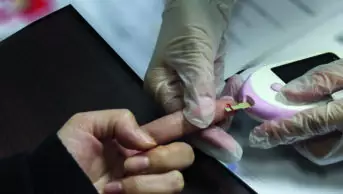When the new medicine service (NMS) launched in October 2011, it represented a landmark moment for community pharmacy.
The NMS, aimed to improve medicines adherence and patient outcomes, was more than just another string to community pharmacy’s bow — it was a clear sign of the profession’s direction of travel.
“When it launched, the NMS was a considerable step forward in terms of clinical service development in community pharmacy,” recalls Olivier Picard, chair of the National Pharmacy Association (NPA).
Fast forwarding to today, the NMS has garnered plenty of indicators of success. Not only has it received positive evaluations on its value to the NHS and patient care — most notably from the University of Nottingham 2024 study1 — but pharmacies submitted over £150m in claims in the year ending July 2025, according to analysis of NHS Business Services Authority (NHSBSA) data by The Pharmaceutical Journal (see Figure).
At the same time, there have been plenty of recent changes — to the scope of the service, payment structures and the use of sub-contractors2,3.
Given the perceived success of the NMS so far, it remains to be seen how much of an impact recent changes will have, and it is clear that the service will need to evolve to meet future demand.
Life-changing intervention
Research confirmed the positive impact of the NMS early on. In 2012, a study of PharmOutcomes data revealed that around 18% of the 224,554 patients (n=35,249) recruited through the service in its first year were not taking their medicines as prescribed4. Nearly one-third of those 35,249 patients (n=11,243) became adherent to their medicines after talking to their pharmacist, according to the analysis of over 230,000 interventions.
Then came a randomised controlled trial of 504 participants across 46 community pharmacies in England in 2014. Published in the BMJ, the study by the University of Nottingham revealed the NMS increased the proportion of patients adhering to their new medicine by around 10%1.
Non-adherence to medicines is a significant problem, which the new medicines service can address
Alastair Buxton, director of NHS services at Community Pharmacy England
Community Pharmacy England (CPE) has been busy highlighting these benefits to the government. Its latest economic analysis shows the NMS could deliver £23bn in value each year, for a cost of just £307m5 — a 75:1 return on investment.
“The NMS has become a key community pharmacy service and deservedly so,” says Alastair Buxton, director of NHS services at CPE.
“Non-adherence to medicines is a significant problem, which the NMS can address.”
Anecdotal examples of interventions point to their potentially life-changing value. Sid Dajani, who runs Wainwrights Chemist in Bishopstoke, Southampton, recalls one older patient with COPD who was confused by the multiple medications they were taking and “would have died” if it wasn’t for an NMS consultation. In another anecdotal example, an intervention helped to uncover a case of lung cancer.
“The NMS has undoubtedly delivered benefits for patients, particularly in improving adherence and understanding of newly prescribed medicines,” says Jay Badenhorst, director of pharmacy at the Pharmacists’ Defence Association (PDA).
Pharmacy teams have also rapidly scaled up their service provision since 2011. In the first month of NMS, pharmacy contractors submitted a total of 10,121 claims for payment, according to The Pharmaceutical Journal’s analysis of NHSBSA data. In the year to July 2021, the number of annual claims surpassed the 1 million mark for the first time, averaging over 94,000 claims per month. In the year to July 2025, there were more than 7 million claims, equivalent to 590,000 claims per month.
As a result, the NMS is now an important income stream for contractors. In the year to July 2025, claims totalled nearly £156m, around eight times as much as ten years ago, when claims stood at just under £19.5m.
The value of pharmacy
“People have started to build the NMS into the process, and it’s business as usual for most pharmacies,” says Mike Hewitson, owner of the Beaminster Pharmacy and The Abbey Pharmacy in Dorset.
“We have embraced NMS as a service because it shows the value of the pharmacist at the start of the medicines journey.”
That value has also been recognised by the government, which has supported the expansion of the service. When the NMS began, it covered just four areas: hypertension, asthma/COPD, diabetes and patients on anticoagulants/antiplatelet medication. It now spans 18 conditions, including heart failure, Parkinson’s disease and — from October 2025 — depression2.
The clinical need for the latter is clear, says Arti Shah, a mental health pharmacist in secondary care. “After a consultation, when a patient is prescribed an antidepressant, it can understandably be an overwhelming and worrying time,” she explains (see Box). “Even with a thorough consultation, patients may need extra support to fully understand their diagnosis and the medication, which is where pharmacists can help.”
How to talk to patients starting antidepressants
From October 2025, the new medicines service (NMS) includes eight antidepressants in its scope. The service stands to make a huge difference to patients, says Arti Shah, a mental health pharmacist in secondary care.
“When patients are prescribed antidepressants, they can feel worried, overwhelmed or tearful,” she explains. “Pharmacists can provide a listening ear to help patients process such a big diagnosis.”
In the first NMS consultation, offering that support will be vital. The first few weeks of treatment can be challenging, as there is an increased risk of agitation, anxiety, hopelessness or even suicidal ideation.
“One crucial message to convey is how long antidepressants typically take to work,” says Shah. “Some patients may notice small improvements in the first couple of weeks, particularly in sleep or appetite, but it often takes four to six weeks to feel the full benefits. Side effects, however, can appear earlier, which can lead to patients stopping the medication too soon. Forewarning patients about these timeframes and offering support can improve adherence and outcomes.”
The follow-up consultation can involve discussion of any adverse effects, and how to manage them. Common side effects of antidepressants include nausea and other stomach upset, sleep changes (either insomnia or feeling more tired) and dry mouth. Some people may also experience weight gain with longer-term use, depending on the medicine.
Pharmacists can advise on ways to manage these, such as taking the medicine with a small amount of food to reduce nausea, taking sedating medicines at bedtime (or activating ones in the morning) to help with sleep, and using sugar-free sweets, gum, or ice chips to ease dry mouth.
“The follow-up appointment is an ideal time to ask the patient how they are feeling, review whether their symptoms are improving, and check for any side effects,” says Shah. “They may even want to bring a relative along.”
The inclusion of adults with depression could lead to a sizeable boost in service numbers. From October 2025, eight antidepressants — including citalopram, fluoxetine and sertraline — fall under the NMS. In 2024, nearly 24.5 million prescriptions for sertraline hydrochloride were dispensed, according to the NHSBSA’s ‘Prescription cost analysis for England 2024/2025’6. In the case of citalopram hydrobromide, just shy of 13.4 million items were dispensed. Across all eight drugs included in the service specification, a total of 66.2 million items were issued in 2024.
There is just one crucial limiting factor for pharmacy teams: workload. That is why pharmacy bodies have given a cautious welcome to the expansion of the service.
The main pressure is workforce capacity — pharmacy teams need the time and resource to deliver thorough consultations
Tase Oputu, chair of the Royal Pharmaceutical Society English Pharmacy Board
“Pharmacists are well placed to support patients starting antidepressants by answering questions, addressing side effects and helping with adherence,” says Tase Oputu, chair of the Royal Pharmaceutical Society (RPS) English Pharmacy Board.
“The main pressure is workforce capacity — pharmacy teams need the time and resource to deliver thorough consultations.”
Badenhorst echoes this caveat. “The inclusion of antidepressants in the NMS is a welcome expansion, recognising the pharmacist’s role in supporting patients with mental health conditions,” he says.
“However, the PDA has consistently raised concerns about workforce capacity.
“Without investment in staffing and infrastructure, expanding the scope of services risks overburdening pharmacists,” he argues.
“The potential for impact is there, but it must be matched with adequate resources, training and support to ensure safe and effective delivery.”
NMS payment changes
Badenhorst is particularly concerned that the service expansion has coincided with potentially hefty changes. The first is the introduction of split payments in April 2025. Rather than a £28 fee for the full service, which spans two interventions, pharmacies will now claim £14 for each intervention3.
The logic is clear. It is understood around half of NMS interventions only involve one consultation, rather than two. CPE has billed the change as a “simplification” of the payment structure. It is also working to communicate the new structure to pharmacy teams to ensure they do not miss out on payment.
Still, Badenhorst has misgivings. “There’s concern that this structure may result in under-claiming — particularly for the second stage, which undermines the value of the service and places additional pressure on pharmacists already working in stretched environments,” he says.
“While £28 for a full NMS episode is an improvement in transparency, it may still fall short of recognising the full professional input, especially when consultations are complex or require follow-up over extended periods,” Badenhorst adds.
A fully in-house service
More concerns, however, have been voiced around the second change — to the legal wording around sub-contracting the NMS in the directions3. The Department of Health and Social Care (DHSC) insists sub-contracting was never allowed. The updated wording to outlaw the practice — expected later in October 20257 — has therefore been presented as a clarification rather than a change in stance.
However, many independent pharmacies had been relying on external companies to manage the workload of the NMS on top of increasing prescription volumes. This is a source of concern for the NPA.
“Although we are still assessing the impact of changes to subcontracting, there’s a clear risk that this could disproportionately affect some independent pharmacies,” says Picard. “In particular, we don’t want unnecessarily to curtail the output of those small independent pharmacies that currently make use of the current provisions to meet the demands of the service.”
Indeed, some smaller operations have been reaping big benefits from using external providers. Online business PillTime Pharmacy delivered the fifth highest number of NMS consultations in the country — 939 — in May 2025, according to NHSBSA data. That was made possible by a partnership with Encon Pharma, which offers NMS outsourcing.
Awais Hussain, director of Encon Pharma, stresses that its service is of a high quality. “We’ve gone through assurances for the bespoke platform we built. Our platform is fully auditable. We thought if anything, [the DHSC] would put some safeguards in place to ensure the people offering the service were doing so to a high standard.”
Hussain fears many independents will now struggle to bring the service back in-house. “Their business models have changed, and they’re reliant on sub-contracting and the revenue that brings, which can be around £2,000 a month,” he explains.
“From my estimate, there are over 1,000 pharmacies that are subcontracting. We were one of the smaller ones [companies providing the service] and we had 150 branches.”
Dajani was one of the contractors who turned to subcontracting. He did so “reluctantly”, owing to workload pressures, and he fears patient care will suffer with the removal of this option.
“We did our due diligence and people are very happy with the service,” he stresses.
“The NHS isn’t supporting us at the moment, so we need those private providers.”
Bringing the NMS back in house means “we’re going to be sucked under the boat and drowned”, Dajani fears.
“That’s going to put a lot of strain on my time. It means I’m going to have to give up something else, which is detrimental to patient health.”
Prescription volumes are growing at such a rate everywhere, I don’t think pharmacies will have a choice other than to think about how they manage their workload
Mike Hewitson, owner of the Beaminster Pharmacy and The Abbey Pharmacy in Dorset
Hewitson was also recently considering sub-contracting. In the wake of the latest update, he’s instead looking at a hub-and-spoke model to manage prescription volumes. “Prescription volumes are growing at such a rate everywhere, I don’t think pharmacies will have a choice other than to think about how they manage their workload,” he argues. “We’re looking at 1.3 billion items in the next three years. If we are to lose 2,000 pharmacies, that’s a 50% increase in the workload.”
Further expansion
The message is almost unanimous: the NMS is a valuable, cost-effective service, but pharmacy teams need the time to conduct interventions to the best of their ability. If the workload issue is resolved, supporters see no reason why the service should not be expanded further.
“Adding antidepressants to the scope of the service is a welcome expansion, but we want NHS England and the government to go further still, given the proven benefits of NMS to so many people, over a long period,” says the NPA’s Picard.
That’s backed up by Oputu of the RPS, who suggests patients with conditions such as cancer could benefit from the service — as long as the expansion is backed by “appropriate funding, workforce planning and investment in training”.
Hewitson goes even further. “If we’ve got a really impactful service that has good evidence behind it, and can help patients, why can’t it be any medicine at that point? Why only specific medicines? The intervention pays for itself many times over.”
Of course, pharmacy teams will also need to be paid a rate that allows them to incorporate the service into an ever-higher workload.
“I’m very fearful for the future of NMS because the funding hasn’t gone up but the work has gone up, and every time we try to find a way to make things work, we’re told it’s not good enough,” sums up Dajani.
Arguably, the issue of pay and workload will be the real determinant of the future of the NMS. It could dictate whether in another few years’ time, there is an equally positive story to tell on its outcomes.
- 1.Elliott RA, Boyd MJ, Salema NE, et al. Supporting adherence for people starting a new medication for a long-term condition through community pharmacies: a pragmatic randomised controlled trial of the New Medicine Service. BMJ Qual Saf. 2015;25(10):747-758. doi:10.1136/bmjqs-2015-004400
- 2.NHS New Medicine Service – August 2025. NHS Business Services Authority. 2025. Accessed October 2025. https://www.nhsbsa.nhs.uk/nhs-new-medicine-service-august-2025
- 3.Community Pharmacy Contractual Framework: 2024 to 2025 and 2025 to 2026. Department of Health and Social Care. March 2025. Accessed October 2025. https://www.gov.uk/government/publications/community-pharmacy-contractual-framework-2024-to-2025-and-2025-to-2026/community-pharmacy-contractual-framework-2024-to-2025-and-2025-to-2026
- 4.Evaluation of Evidence Provided by PharmOutcomes New Medicine Service Data. Community Pharmacy England. November 2012. Accessed October 2025. https://cpe.org.uk/wp-content/uploads/2013/07/PO_NMS_data_evaluation_Nov_2012_full_report.pdf
- 5.MP Briefing: Unlocking the future of community pharmacy services. Community Pharmacy England. June 2025. Accessed October 2025. https://cpe.org.uk/wp-content/uploads/2025/06/LPC-Chairs-Forum-MP-drop-in-briefing.pdf
- 6.Prescription Cost Analysis – England 2024/25. NHS Business Services Authority. June 2025. Accessed October 2025. https://www.nhsbsa.nhs.uk/statistical-collections/prescription-cost-analysis-england/prescription-cost-analysis-england-202425
- 7.Services and Regulatory changes coming into force today. Community Pharmacy England. October 1, 2025. Accessed October 2025. https://cpe.org.uk/our-news/services-and-regulatory-changes-coming-into-force-today/



